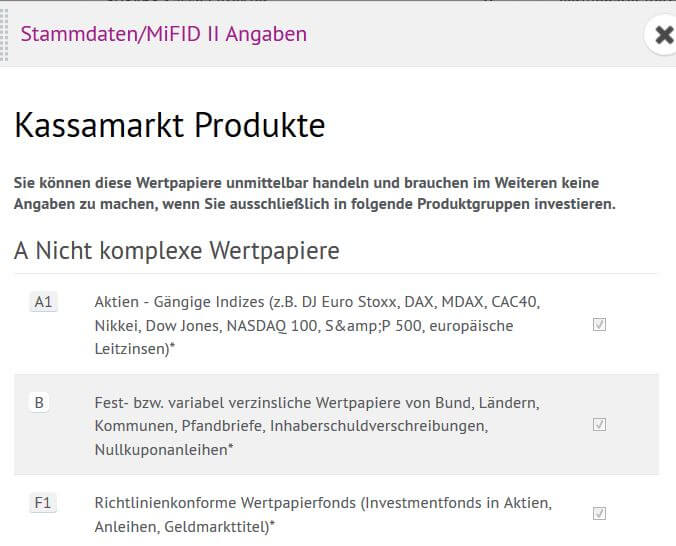A "securities account' is also often simply referred to as 'Brokerage account" or also "stock account" designated. The terms are used synonymously here. But what is a depot? How do I find the best for me? And how can I open a securities account? This article answers these questions. But before we get started, a brief history for classification.
Stock trading then and now
What you can learn here
- Stock trading then and now
- What is a depot now?
- What is a sample portfolio?
- Open a securities account and place an order
- Securities account: where to open?
- How to transfer a securities account?
- Opening a custody account: What is the risk?
- Opening a custody account: Where is this possible?
- Depot fees: Keep your eyes open when comparing depots
- Opening a securities account: how do I do it?
- Closing a securities account: How can I terminate it again? ✉️
- Tips & Tricks: My 7 best tips for opening a securities account
- Securities account for frequent traders and ETF savers: Cap-Trader (live account + sample account)
- Opening a free Girokonto
- Helpful Links - Further information
Stock trading used to be comparable to what happened at a weekly market. Traders were instructed to buy or sell securities on the exchange trading venue. Buying a share gave you a written certificate confirming that you owned shares in a particular company. The word security was derived from this document. Transactions often lasted several days due to the issuance of documents.
As a result of digitalization, the majority of transactions have now been transferred to the Internet. This means that securities can be bought and sold on a PC at home. Anyone who wants to buy shares, ETFs, funds, bonds or other securities today sets up a securities account at their bank. Once the account has been activated, it is possible to trade in global stocks or ETFs in real time. But what is a securities account anyway? After all, you should know where your money is.

What is a depot now?
Now that the history of the depot has been roughly clarified, let's take a closer look at what a securities depot actually is. Brokerage account is French and means camp in German. And that's exactly what a depot is: a warehouse for your company or, more precisely, your shares in it. It's easy, isn't it?
"Certificates" about company shares are stored in a securities account. In the past, these documents were handed out and stored in a locker, for example. In contrast, the securities held are now visible on the custodian bank's website after logging in. Custody is therefore digital, printing the share itself is no longer necessary.
A securities account functions in a similar way to a checking account. It logs all deposits and withdrawals made for a security. In addition, the securities account displays various key figures of the security. These include, for example, the daily percentage change, the price gain, the current value and other key figures. These key figures are displayed individually for each security and as a total value for all securities. The total performance of the securities account is often also referred to as "overall performance" designated.
The question "What is a securities account?" can be summed up with the sentence: A digital depository for securities get answered. Since the question of what a securities account is has now been clarified, let's go further into practice: here it is helpful to first open a sample account in order to be able to observe interesting securities more closely without having to use real money for it.
Where are the securities stored?
Nowadays, a securities account is nothing more than a database entry. In the past, shares were large paper bills that were stored in a safe deposit box at the bank. On the dividend date, a piece was cut off the sheet - the "coupon" - and you received your dividend in cash in return.
Today, the papers are stored digitally on the computer, but not with the broker itself, but with Clearstream, a subsidiary of Deutsche Börse AG. Clearstream is a custodian for securities
What's in the depot then?
The depot at the broker is actually nothing more than a record of references to Clearstream. The depot is therefore basically only for sale, purchase and reporting. Since the function of the depot is simple, there is a strong price war for customers. In order to use this to your advantage, it is best to check the depot comparison regularly. Here you can always see all costs directly at a glance.
Why is a clearing account still being opened in addition to the custody account?
A custody account can only hold securities and no money. Therefore, all cash flows such as deposits, withdrawals or dividend payments must be processed via a separate account - the clearing account.
- When buying securities, the bank debits the amount including the fees from the clearing account.
- When selling, it works the other way around: the amount from the sale minus fees is credited to the clearing account.
- The bank also pays dividends to the clearing account.
What is a sample portfolio?
>> Open a free Cap Trader sample portfolio and test your investment strategy <<
A very useful feature (especially for active investors) is the sample portfolio. Here all securities can initially be bought with play money. After the papers have been stored in the sample depot, all relevant key figures can be monitored effortlessly. This saves you a lot of time as you can monitor all the stocks you are interested in at a glance without having to gather the information individually. This gives you the opportunity to reconsider your purchase if, for example, the paper has not developed as expected after the observation phase.
Open a securities account and place an order
First you have to open a deposit with a custodian bank. A few days after opening you will receive your access data and the account number of your clearing account. You then transfer the desired investment amount to your clearing account. Now you can buy stocks, bonds or ETFs. The amount will be deducted from your clearing account. Buying and selling is also called "ordering".
Fall when buying and selling fees which reduce the investor's return. Depending on the provider, there are very big differences between 5 euros and several hundred euros. Particularly cheap providers are, for example: onvista (5 euros per purchase/sale) or FlatEx (5.90 euros per purchase/sale)
Selling works the same way: After the security has been sold, the amount minus the selling fees is credited to your clearing account.
Also important to know: Shares, funds and securities are considered special assets. The bank manages this special fund on a fiduciary basis for the investors and separate from its own assets. In the event of the bank's insolvency, the deposited securities are therefore protected and do not have to be used to service creditors' claims. A securities account is therefore particularly well protected in the event of insolvency.
Securities account: where to open?
It is possible to open a securities account at almost every bank. Nevertheless, you should definitely compare the conditions beforehand. The comparison calculator offers a good overview of various securities accounts.
The price range for an order of, for example, €1000 can range from €5 to over €25 or more. Each provider adapts to a specific target group such as small shareholders (example: onvista or FlatEx)
You can make a lot of money with onvista or FlatEx save. These banks offer fixed-price deposits. The price for sales and purchases here does not increase with the order volume, as is the case with many other banks.
So choose the custody account that suits you best. The depot comparison calculator can help you with this. The conditions are constantly updated so that you can find the right depot for your needs with minimal effort.
How to transfer a securities account?
Are you dissatisfied with the service or the conditions of your custodian bank? Then you can switch to a new provider free of charge. The change is free of charge by law. However, only whole shares can be transferred. Fragments such as those created by saving with savings plans must be sold, which incurs the sales fees.
A deposit transfer is free of charge by law.
This was decided by the BGH in 2004
Except for the exception described, you do not have to reckon with any additional costs when transferring the securities account. The best thing to do is to apply to your new bank for a custody account transfer. The new bank takes care of the rest of the procedure, just like a new DSL provider does. Termination is also possible directly via the new provider.
Opening a custody account: What is the risk?
In the event of the insolvency of the custodian bank, the customer's securities assets are not affected. It is managed separately as a special fund. Therefore, a deposit insurance as with accounts with securities is not necessary.
In order to buy and sell securities, investors also need a clearing account – from this the money is collected when shares are bought and credited when they are sold. Most banks will open a clearing account for you free of charge when you open a securities account. Some banks also accept accounts from third-party banks - this could be your existing checking account, for example. You can find out more about this in the process of opening your depot! By the way: There are only three requirements to be able to invest in the stock market: You have to be fully legally competent, have a custody account and of course have some money left over to invest. Incidentally, it is a myth that only the wealthy can buy shares!
Opening a custody account: Where is this possible?
Which is the right custody account for you depends on your preferences. Do you value personal contact with your bank advisor? then look for a classic branch bank. However, you usually pay additional fees for this service. Best conditions: Do you prefer to do all your banking 24/7 online anyway? then you benefit from the more favorable conditions of online brokers. So-called discount brokers also offer custody accounts for private investors. They are often offshoots of larger institutes with a clearly customer-friendly cost structure. A special case is the fund depot: No shares can be bought here, only funds from the corresponding fund company can be bought.
Depot fees: Keep your eyes open when comparing depots
The amount of the fees charged for the depot varies greatly between providers. In principle, the following fees are charged by the brokers.
custody fees
These are fees charged by your custody provider for the safekeeping of securities. Therefore, they are also called custody fees. As a rule, these fees are a "relic" from the offline era. Online banks almost always hold your securities in safekeeping free of charge. Branch banks, on the other hand, charge twice: once with a fixed fee and then with an additional variable fee, depending on the volume of the securities account. Since custody fees are incurred even without transactions, they are extremely relevant, especially for beginners who only execute a few trades a year.
Order or Transaction Fees
Order or Transaction Fees are incurred on the purchase and sale of securities. As a rule, they depend on the volume of the purchase or sale. Here, "flat fee" cost models are increasingly gaining acceptance. Here, a (usually very low) fee is charged for the purchase or sale regardless of the volume traded (e.g. FlatEx or onVista).Frequent traders must pay particular attention to these fees.
exchange fee
The exchange fee includes the broker's brokerage fee and any costs incurred for using the trading venue for each purchase or sale. Because it makes a difference in terms of costs whether you buy the security on the Stuttgart Stock Exchange, Frankfurt, Munich or another trading venue.
additional services
Some brokers charge additional fees for placing limit orders. With a limit order, the customer indicates in advance that he will buy or sell a security when the price reaches a certain level. This fee should also be taken into account when comparing depots. You can find the fees for limit orders under the Product Details tab.
TIP: In order to give you a better overview of the sum of the fees, these are already included in the comparison calculator total cost listed.
If you want to have the best depot offer for you, you have to use a customizable and detailed depot comparison. In the comparison calculator, you can use your approximate number of orders per year and your order volume in € or your savings rate and frequency to find the most favorable depot for you.
Opening a securities account: how do I do it?
The traditional way is to fill out a deposit application at the bank branch. The bank advisor can help with this. Opening a depot online is even easier and faster. After you have found the best depot for you by entering your expected number of annual orders and the approximate order volume, a click will take you directly to opening a depot with your favorite broker. When opening your new custody account, you must provide information on: name, address, place and date of birth, e-mail address and telephone number. You will also be asked about your experience with securities. Your answer serves to classify you in a corresponding risk class. Depending on the risk class, different investment products are then available. For example, anyone who has been trading in bonds, shares or funds for many years will also be activated for riskier transactions, such as special certificates. The risk classification serves to protect the investor from major losses due to transactions that are too risky.
Once the securities account application form has been completed in full, you take the form and your ID to the personnel check at the post office. The post office then forwards your application to the custodian bank. A new trend is authentication via webcam or smartphone app: opening a securities account is now just a matter of a few minutes. ⏰
Once you have sent the application, the bank will usually contact you by letter within a few days and will send you all the necessary documents and access data for your securities account in several separate letters.
Closing a securities account: How can I terminate it again? ✉️
A safe possibility is still the termination of your securities account by letter with signature. Several You can find free templates for terminating your deposit here (Word file). If you want to change, you can also use the exchange service of many banks.
Here you will find more templates for terminating your account (all .docx Word files):
- 1822direkt: free template for terminating your 1822direkt account
- Consors Bank: free template for terminating your Consors Bank custody account
- FlatEx: free template for terminating your FlatEx depot
- ING: free template for closing your ING custody account
- onVista: free template for terminating your onVista depot
Tips & Tricks: My 7 best tips for opening a securities account
- Don't put the cart before the horse : First, define your investment goals. Passive ETF saver or active trader. Be clear about what you want. Only then does the cost comparison of the brokers come into play. Different brokers cater to different audiences.
- For active traders: Try out new strategies in the sample portfolio first: Test your strategies in a sample portfolio before you use real money.
- use special promotions Direct banks and online brokers are in fierce competition with each other: Take advantage of special promotions when opening. Starting credits and free trades are not uncommon!
- Availability of customer service ☎️: At least one hotline and one email should be available. Tip: Everyone calls the hotline in the evening. Try it early in the morning
- Traveling a lot? Make sure you have a usable app
- Fill out self-disclosure The bank classifies you as a newcomer to the stock market even with years of experience and blocks you for numerous securities.
- Read through product details : All the essentials are summarized here. Read the tab in the comparison calculator carefully.
>> Open a free Cap Trader sample portfolio and test your investment strategy <<
Securities account for frequent traders and ETF savers: Cap-Trader (live account + sample account)
Opening a free checking account
Read more about opening free checking accounts at the following banks (click on the logo)






Helpful Links - Further information
>> The big checking account comparison << Click here
>> Test winner accounts awarded in 7 categories << How do you like the account in category 3?
>> May it be a few more interest? << To the overnight money comparison
>> Depots for every type of investment << To compare depots
>> Robo advisor comparison << Invest smartly with minimal effort!
>> Apply for Schufa information free of charge << How do I do that?















